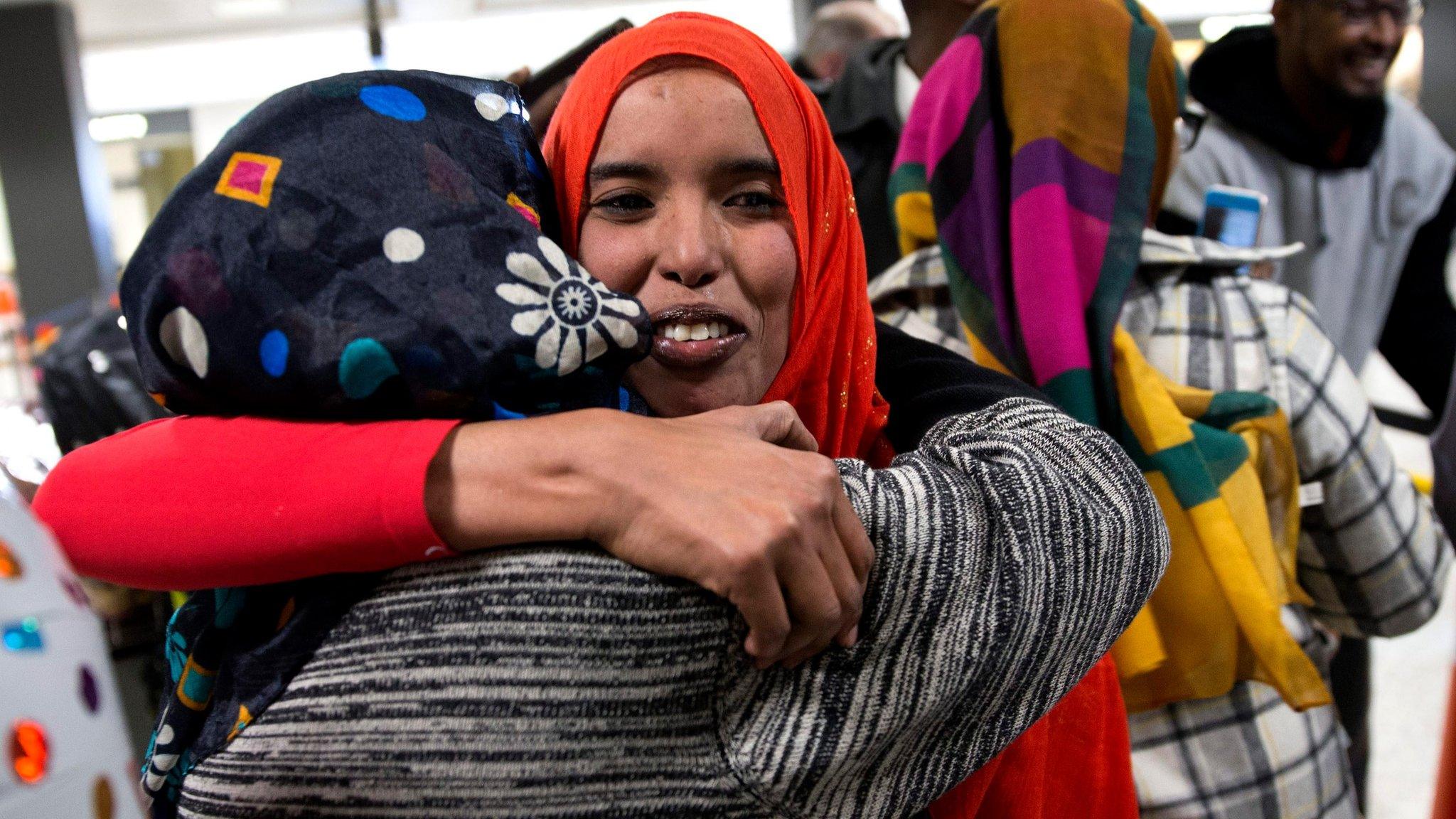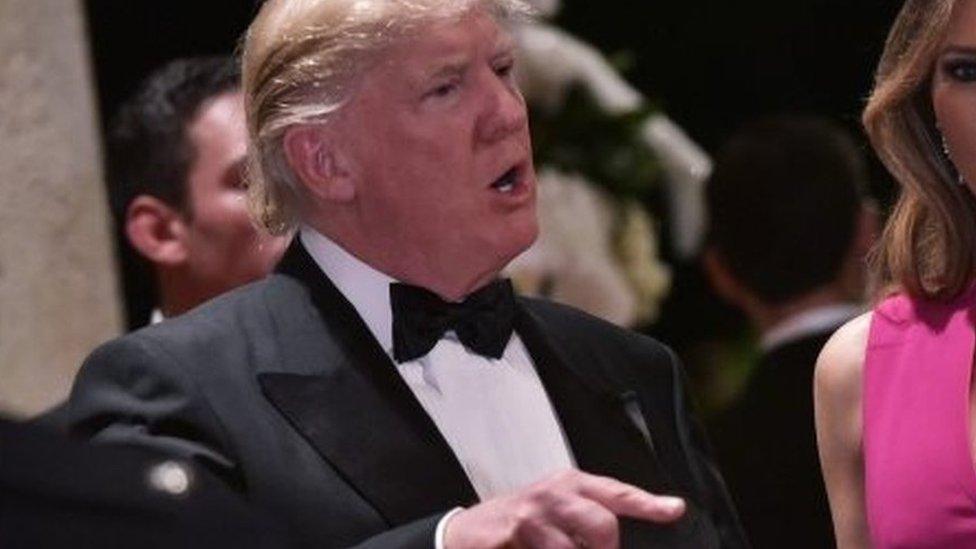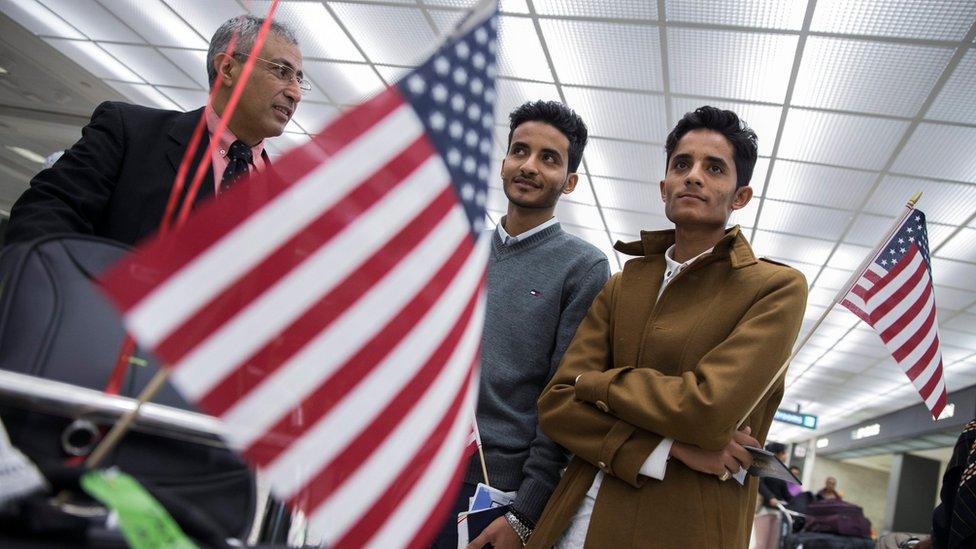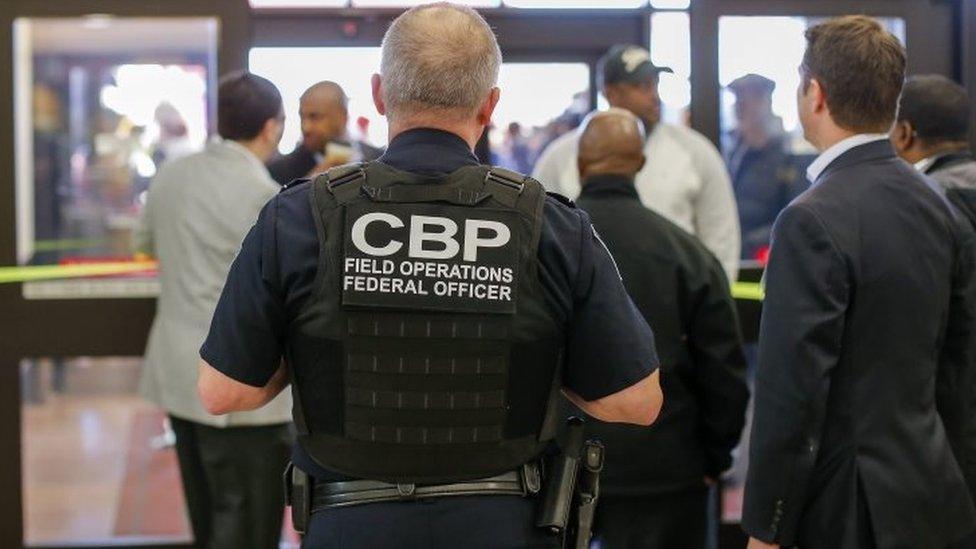Trump travel ban: States urge retention of temporary block
- Published

Somali Najma Abdishakur (centre) was welcomed by her mother at Washington Dulles International Airport
Restoring President Donald Trump's ban on immigrants from seven mainly Muslim countries would "unleash chaos again", lawyers for two US states argue.
Counsel for Washington and Minnesota urged a federal appeals court in San Francisco to maintain its nationwide temporary restraining order.
They are being backed by technology firms which say the travel ban is harmful to their businesses.
Trump administration lawyers are expected to respond later on Monday.
Friday's restraining order has led to a furious response from Mr Trump, who claims national security is at risk.
How did we get here?
An executive order, external by President Trump issued on 25 January saw:
nationals from Iraq, Syria, Iran, Libya, Somalia, Sudan and Yemen - even those with visas - banned from entering the US;
a temporary ban on all refugee admissions;
the reprioritisation of minority religion (interpreted to mean Christian) refugee claims;
a ban on all Syrian refugees;
a cap on total annual refugee admissions to the US of 50,000.
It caused confusion at US and foreign airports when it came into force, and was widely condemned, although polls suggest that US public opinion is sharply divided on the policy.
On Friday the order was suspended by a federal judge in Seattle, James Robart, after the states of Washington and Minnesota took legal action against the travel ban on the grounds that it was unconstitutional and harmful to their interests.

Donald Trump has said he is confident his administration's appeal will succeed
Judge Robart's ruling, external is designed to allow the two states time to make their case. It suspends the seven-country travel ban, the temporary refugee admissions ban, the reprioritisation of minority religion refugee claims and the ban on Syrian refugees, but the cap on overall US refugee admissions is not suspended.
As a result of the suspension, visa holders from the seven mainly Muslim countries will be allowed to enter the US until the full case has been heard. The state department has been reversing visa cancellations, and US homeland security employees have been told by their department to comply with the ruling.

Read more on this story:

Many visa-holders have scrambled to get on flights to the US, fearing the window for entry may close.
At the weekend, the appeals court in San Francisco turned down a Department of Justice request to set aside the restraining order.
In its appeal, external, the department said Judge Robart had overreached by "second-guessing" the president on a national security matter. It also argued that only the president could decide who can enter or stay in the US.
But the court did not agree, leading to a full case hearing and Monday's legal submissions.
What do the ban's detractors say?
Washington and Minnesota argue that as well as being unconstitutional, the travel ban is harmful to their residents, businesses and universities.
Their lawyers told the appeals court, external that any resumption of the ban "would reinstitute those harms, separating families, stranding our university students and faculty, and barring travel".
They added: "Defendants now ask this court to unleash chaos again by staying the district court order. The court should decline."

Yemeni brothers Tareq (centre) and Ammar Aziz were denied entry under the ban but arrived at Dulles on Monday
They also lodged a statement, external signed by a host of national security officials - including former secretaries of state John Kerry and Madeleine Albright, and former CIA director Leon Panetta - which describes the travel ban as ineffective, dangerous and counterproductive.
Lawyers for tech firms including Apple and Google have also lodged arguments with the court, saying that the travel ban would harm their companies by making it more difficult to recruit employees.
How has President Trump responded?
President Trump has attacked the federal judge in Seattle who originally blocked his travel ban and the judiciary in general, saying Americans should blame the courts "if something happens".
Mr Trump also said he had instructed border officials to carry out rigorous checks.
"The American people are very accustomed to this president speaking his mind" - Vice-President Mike Pence
In a series of tweets, external on Sunday, Mr Trump said: "I have instructed Homeland Security to check people coming into our country VERY CAREFULLY. The courts are making the job very difficult!"
"Just cannot believe a judge would put our country in such peril. If something happens blame him and court system. People pouring in. Bad!"
What is Congress saying?
Democrats and some Republicans have criticised Mr Trump's comments about the judiciary.
Democratic Senator Patrick Leahy, a member of the Senate Judiciary Committee, said Mr Trump seemed "intent on precipitating a constitutional crisis".
Meanwhile, Republican Senate leader Mitch McConnell told CNN it was "best to avoid criticising judges individually".
Judge Robart, who was nominated by Republican President George W Bush, has served on the federal bench since 2004.
US border checks - how they work
All persons arriving at a US port of entry are inspected by Customs and Border Protection (CBP) officers.
Visitors must either have valid US visas, or hold "Green Cards" that authorise them to live and work in the US permanently, or have applied for authorisation under the Visa Waiver Program via ESTA (the Electronic System for Travel Authorization) before their visit. Travellers from certain countries can use Automated Passport Control (APC).

A CBP officer at Atlanta airport
All visitors must complete declaration forms. They may also have their fingerprints and photos taken, as CBP uses biometric technologies to verify travellers' identities.
CBP officers may also ask to inspect luggage or personal items.

Have you had your travel to the US disrupted by the ban? Has Friday's ruling changed your circumstances? Let us know about your experiences. Email haveyoursay@bbc.co.uk, external with your stories.
Please include a contact number if you are willing to speak to a BBC journalist. You can also contact us in the following ways:
·Tweet: @BBC_HaveYourSay, external
·Send an SMS or MMS to +44 7624 800 100